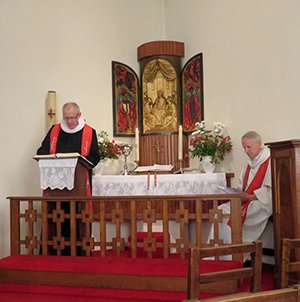Conferences
Every two or three years we hold a conference.
Here is a list of previous conferences:
| 1960 | England | Ruislip | ELCE | Faith and Mission |
| 1961 | France | Châtenay-Malabry | EEL-SFB | We are growing together by witnessing together |
| 1962 | Germany | Berlin | ELFK+ElaLK | Liturgy and Evangelisation (Volksmission) |
| 1963 | Finland | Lahti | STLK | Europe and Mission: The justification of Mission work in its own country |
| 1965 | Germany | Brunsbrock | ELFK | Public Relations and Evangelisation |
| 1969 | England | Petts Wood | ELCE | Do we reach people with our proclamation? |
| 1971 | Denmark | Copenhagen | ELFKiDk | The una sancta and Mission |
| 1976 | Belgium | Anvers | EEL-SFB | Confession (Luth. Confessions) and Mission |
| 1978 | England | Cambridge | ELCE | The role of the confessional Lutheran Churches |
| 1982 | Germany | Zwickau-Planitz | ELFK | The modern man and the Mission answer to his need/distress |
| 1986 | France | Woerth | EEL-SFB | Church instruction of the children today |
| 1988 | Denmark | Hilleröd | ELFKiDk | The charismatic Movement |
| 1990 | Finland | Siitamaia | STLK | The Lutheran Church as a pastoral Church (seelsorgerliche Kirche) |
| 1993 | Germany | Wiesbaden | SELK | The Holy Scripture exposed to edify the Church of Christ. |
| 1996 | England | Cambridge | ELCE | Challenges to the Church (Islam, permissive society, close living together with other denominations) |
| 1999 | France | La Petite Pierre | EEL-SFB | The satis est and the adiaphora |
| 2002 | Germany | Berlin | SELK | Youth work in the Church |
| 2004 | Belgium | Antwerpen | ELKB | The Diaspora of the Church |
| 2006 | England | Hoddesdon | ELCE | My contribution to my congregation’s life |
| 2008 | Denmark | Aarhus | ELFKiDk | Family and children (God’s plan and the real world) |
| 2010 | Portugal | Ermesinde | IELP | Mission dimension of the congregation with a local neighbourhood focus |
| 2012 | France | Mulhouse | EEL-SF | How to read and study the Bible |
| 2014 | Germany | Bleckmar | SELK | Living in an ecumenical world |
| 2016 | Belgium | Antwerpen | ELKB | Reformation then … and now (ecclesia semper reformanda) |
| 2018 | England | Hoddesdon | ELCE | Good News in a Fake News World |
| 2021 | online | online | online | Sharing Hope in Times of Fear |
| 2023 | Germany | Essen | SELK | Gender and Church – From a theological, legal and personal Perspective |
| 2025 | Portugal | Lisbon | IELP | Is the Christian Faith too foolish for our young Generation? |
| 2027 | France | Strasbourg | EEL-SF | How Confessional Lutheran Churches stand in Public Perception |
28. ELC 2025: Is the Christian faith too foolish for our young generation?
Lisbon, Portugal
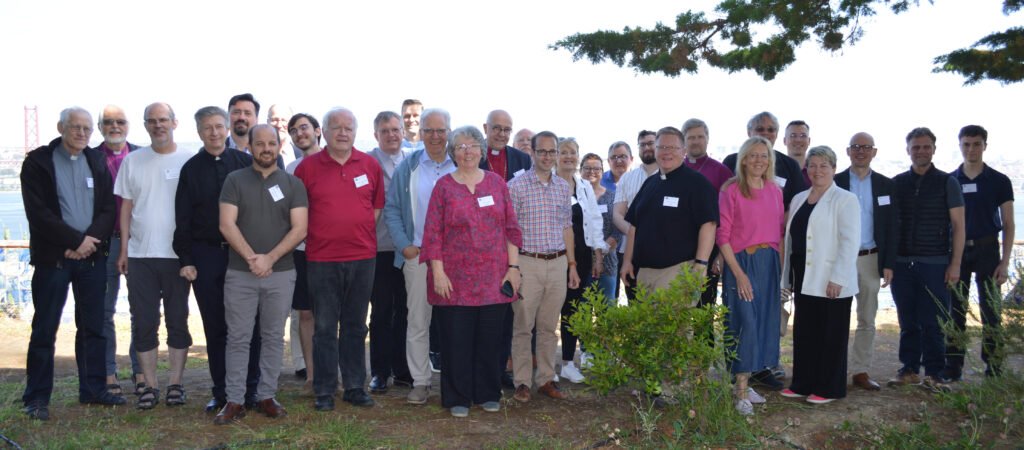
28th European Lutheran Conference in Lisbon
selk-news – 28 May 2025 – At the invitation of the Portuguese Evangelical Lutheran Church (IELP), the European Lutheran Conference (ELC; www.euluthconf.org) was held in Lisbon (Portugal) from 21 to 24 May 2025. The main theme of the conference was the question – inspired by 1Corinthians 1:18: ‘Is the Christian faith too foolish for our young generation?’ After lengthy discussions, the answer was a resounding ‘No!’ The Christian faith enables us to live the best life on earth, blessed by God. Young people go through a process of maturation in which they seek guidance for their lives. Adult Christians can and should accompany them on their journey.
The report by Bishop Ivan Laptev from the Evangelical Lutheran Church of Ingria in St. Petersburg (Russia) received special attention. He reported on large, very impressive art installations on biblical themes. Young people love new, strong visual impressions. Visitors to the exhibitions, for which they even paid admission, took photos of them and shared them on social media. The church is not allowed to do mission work, but people are open to new impressions. They begin to ask what it means that they see.
Pastor Markus Nietzke (Hermannsburg, Germany) gave a presentation on the topic: ‘Reaching out by providing a strong biblical foundation.’ He named the needs of young people and misses their questions when they leave the church. In an increasingly uncertain world, they seek to belong to a group. How wonderful it would be if that group were the church, fellow Christians who accompany them and engage in open dialogue with them on an equal footing. Pastor Nietzke emphasised that Christ is our righteousness when we make mistakes or fail. Young people should also hear this promise and internalise it for themselves.
Pastor Garry Heintz (France) addressed the topic: ‘Reaching out by dealing with ideologies (questioning our faith).’ He addressed a whole range of ideologies that one should be aware of in order to be prepared to counter them. But the goal of the debate is not to win an argument, but to win a person. It is about arguing and asking questions gently. Jesus also asked people questions so that they would think things through. When asked why Christianity is not an ideology, the discussion revealed that ideology is enforced by violence. But Jesus loved people without violence and even went to the cross and to his death for it.
President Georg Samiec (Ipswich, U.K.) spoke on the topic: ‘Reaching out by incorporating examples of best practice’. In his opinion, it is not so much a question of age, but whether someone is a Christian or not. Coming to faith and living in it is the work of the Holy Spirit. We can only accompany other people, walk with them, stay by their side and practise love in the certainty that God uses this interaction to bring them to Him. President Samiec emphasised that it is the relationship with one another that matters, that we should listen more than we speak, always listening to understand the situation of the other person. And our teaching should be clear, understandable and personal. We should not forget intercession and blessing. And the interaction between young and old should be encouraged so that they can learn from each other. In his opinion, the church is the largest intergenerational organisation on earth, a large family of many generations.
During the conference, the Confessional Lutheran Church in Switzerland with Pastor Guillermo Herigert was accepted as a new member. It has only two congregations and is dependent on close ties with other confessional Lutheran churches and their cooperation. For loneliness is not a good counsellor, as Pastor Herigert emphasised.
A total of 34 delegates travelled from Belgium, Denmark, France, Germany, Great Britain, Norway, Portugal, Spain, Ingria/Russia, Switzerland and the USA.
The Steering Committee consisting of Pastor Claudio Flor (Secretary, England), Pastor Philippe Volff (Vice-Chair; France) and retired Pastor Klaus Pahlen (Chair; Germany) was confirmed for another term. It is preparing the next ELC conference, which is to take place in Strasbourg, France, in 2027.
27. ELC 2023: Gender and Church –
From a theological, legal and personal Perspective
Essen, Germany
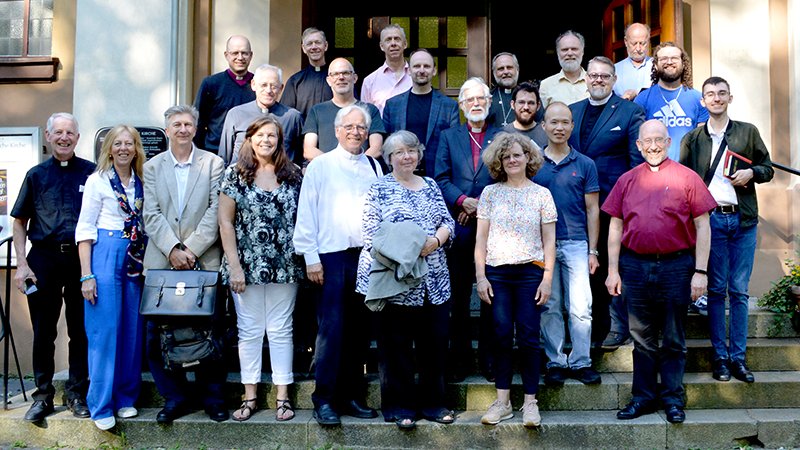
Report from the 27th European Lutheran Conference in Essen, Germany
by Mathew Block | Jul 6, 2023
Essen, 22.06.2023 – Delegates and guests from thirteen European countries, the U.S.A. and Canada gathered from 13th to 17th June at the Evangelical Lutheran Church in Essen, Germany (www.euluthconf.org). After the Covid-19 pandemic, it was the first meeting again in person, usually held every two years. The theme of the conference was “Gender and Church – from a theological, legal and personal perspective”. What might be a taboo for some Christians to talk about, was boldly addressed by three keynote speakers and intensive discussions afterwards.
Prof. Dr. Christoph Barnbrock (Oberursel, Germany) presented his thoughts under the title: “Living as a Christian in a rapidly changing world. Reflections based on the example of the Gender Debate.” He argued that the gender perspective proves to be helpful as a methodical tool. But the gender debate also brings problems, briefly characterized with hostility between representatives of different positions, a radical constructivism in determining one’s identity, and a normative positivism, as if “everything that exists also has its good, possibly even God-given right”. Barnbrock suggested that Christians should overcome polarization, as Lutherans can think two things to be true at the same time (e.g. being righteous and sinner at the same time). This is to avoid simple answers in a complex world. We are all created by God, and as sinners that we all are, “we have no reason to exalt ourselves above others”. He suggested to “approach the debates of our time without fear and with trusting serenity, to show respect and solidarity to those who think differently than we do, and to rediscover ourselves as members of the one body of Christ.”
The second paper was given by the lawyer and notary Claudia Hüstebeck (Göttingen, Germany) to view “Gender and Church” from a legal perspective. She referred to the fundamental rights in Europe and Germany that prohibit discrimination on various grounds, including sex and sexual orientation. She explained the personal status law in regards to the “third gender” and the birth registry entry “diverse”. In Family Law, she showed the development from same-sex partnerships to same-sex marriages and the establishment of equality in regards to taxation and the adoption of a child. Even though churches may see this development critically, she asks, how churches will deal with “marriage for all”, “in particular whether acts of blessing or marriage ceremonies for same-sex couples come into question.” In summary, she says that the legal system of the Western European countries has undergone considerable changes in the past 20 years with the “aim of achieving equality of all sexual orientations.”
The third paper was a personal account of Bishop Juhana Pohjola (Finland), who is facing a legal trial in Finland after the publication of a booklet in 2004 on the relationship of men and women. He is accused of “hate-speech” (against homosexuals), even though the term is not clearly defined. Bishop Pohjola had no intention to break the law or to insult people. He called it a battle between the right of not to be offended and the right of freedom of speech. The prosecutor tried to silence him completely, but the court acquitted him. The Prosecutor claimed that the Bible may only be used as a historical quotation, but not as one’s own opinion. This would mean that a personal confession according to the word of God would be against the law. By this ruling, nobody may be called a sinner. This would be against the dignity of man. However Bishop Pohjola pointed out that all human beings are created in the image of God. That gives people their dignity independent of their acts. It seems that the prosecutor did not understand that God loves the sinners but hates sin. Christian teaching is increasingly answered with apathy, hostility and opposition. “While we might concentrate on the laws of the land and the courts, we should be conscious that the real battle is with the powers and principalities (Eph 6:12), whom Christ has defeated”, Pohjola said.
The European Lutheran Conference does not give guidelines about how churches should act but encourages member and guest churches to learn from our shared experiences on the topic of the conference. The individual churches would have to answer the many theological and practical questions themselves. However, the very stimulating discussions concluded that a blessing of same-sex partnerships or marriages would not be possible, because they are against the will of God. According to his word, God ideally wants couples of a man and a woman that are blessed with children.
The next conference will be held in Denmark, Portugal or Norway, to be organised by the new steering committee of Rev. Klaus Pahlen (Germany), Rev. Philippe Volff (France) and Rev. Claudio Flor (Great Britain).
26. ELC 2021: Sharing Hope in Times of Fear
online
by Mathew Block | Jul 15, 2021
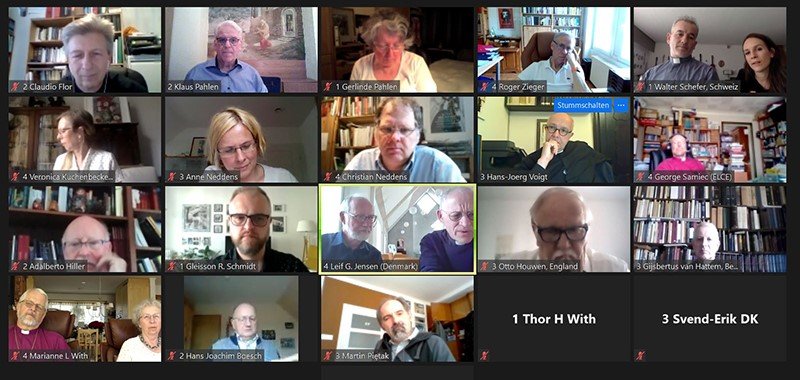
EUROPE – The 26th European Lutheran Conference (ELC) was held online from June 2-4, 2021, following a year’s delay due to the pandemic. Participants gathered under the theme “Sharing Hope in Times of Fear.”
The conference featured three keynote presentations: Rev. Sebastian Gruenbaum of Finland presented on “Living in My Generation: Hopes and Threats of Our Time in the Light of Christ’s Word;” Rev. Dr. Christian Neddens of Germany spoke on “Living with Hope in Daily Life: How the Christian Faith Shapes Our Actions and Witnessing to Our Generation;” and Rev. Dr. Asger Christian Hoejlund of Denmark lectured on “Hope as Drawn from Martin Luther’s Writings of 1520.”
“The presentations stimulated lots of discussion,” noted Chairman George Samiec of the Evangelical Lutheran Church of England (ELCE), who participated in the event. In addition to the pandemic, he said, topics of discussion included personalities, the Last Judgement, looking to the future with fear or love, and the question of whether society is becoming increasingly intolerant. “It occurred to me that our conference theme is applicable all the time and not just in a pandemic,” Chairman Samiec continued, “because our world is full of mishap and mayhem, sudden death and chronic conditions where injustice and the grave seem to have the last word. Jesus has a message for all time because His love can cast out fear (1 John 4:18).”
The conference also featured morning and evening devotions, reports from member churches, group discussions of presentations, and the writing of a paper on the conference theme.
The next conference is set to take place in 2023 in Aarhus, Denmark. The Executive Committee members for that event are the same as for 2021’s: Rev. Klaus Pahlen of Germany’s Independent Evangelical Lutheran Church (Selbständige Evangelisch—Lutherische Kirche – SELK) will serve as ELC President; President Leif Jensen of the Evangelical Lutheran Free Church in Denmark (Den evangelisk-lutherske Frikirke i Danmark – ELFD) will serve as ELC Vice President; and Rev. Claudio Flor of the Evangelical Lutheran Church of England will serve as ELC Secretary.
The ELC is an association of Confessional Lutheran church bodies in Europe. Delegates at this year’s conference included representatives of member churches in Belgium, Denmark, France, Germany, Norway, Portugal, and the United Kingdom, all of whom are also members of the International Lutheran Council. The event also saw guests from churches in the Czech Republic, Finland, Spain, and Switzerland.
25. ELC 2018: Good News in a Fake News World
Hoddesdon, England

ELC: Die Gute Nachricht in einer Welt der Falschmeldungen
SELK auf Tagung in Hoddesdon vertreten
Hoddesdon (England), 5.6.2018 – selk – Zu ihrer alle zwei Jahre stattfindenden turnusgemäßen Tagung kam die Europäische Lutherische Konferenz (ELC) vom 30. Mai bis zum 2. Juni im englischen Hoddesdon im Norden Londons zusammen. Vertreterinnen und Vertreter – Gemeindeglieder und Pfarrer – waren aus Finnland, Lettland, Schweden, Norwegen, Dänemark, Deutschland, der Schweiz, Belgien, England und Portugal angereist. Die Selbständige Evangelisch-Lutherische Kirche (SELK) wurde von Pfarrer Klaus Pahlen (Essen), dem ELC-Vorsitzenden, Gerlinde Pahlen (Essen), Christiane Braunreuther, Kirchenrat Erik Braunreuther (beide Dresden) und Bischof Hans-Jörg Voigt D.D. (Hannover) vertreten.
Das Thema der Tagung lautete “Good news in a Fake news World” (Die Gute Nachricht in einer Welt der Falschmeldungen). Prof. Dr. Tomas Bokedal von der Universität Aberdeen hielt das Hauptreferat zum Thema “Ist das Christentum Fabel oder Fake News?” Als Professor für Neues Testament legte er dar, dass das Christentum von Anfang an in der Situation war, den christlichen Glauben zu verteidigen (Apologetik). Neuere Forschungen hätten gezeigt, dass sich die christliche Kirche nicht langsam entwickelt habe. Vielmehr seien die Glaubensinhalte in den ersten Jahren, wenn nicht sogar in wenigen Monaten entfaltet und der christliche Gottesdienst in seinen wesentlichen Bestandteilen gefeiert worden. Die glaubenweckende Predigt des Evangeliums gehe allem voran. Philosophie, historische Forschung und moderne Naturwissenschaften könnten eine dienende Funktion in der Apologetik einnehmen. Neben weiteren ergänzenden Vorträgen besuchte die Konferenz das Britische Museum. In einer besonderen Führung wurden archäologische Funde aufgesucht, die in einer Beziehung zur biblischen Überlieferung stehen.
Die ELC-Tagung beschloss ein Abschlussdokument – besonders für die Gemeinden der Mitgliedskirchen -, das in Kürze übersetzt und veröffentlicht werden wird. Zuvor war durch einen Beschluss der Mitgliedskirchen die Evangelisch-Lutherische Missionsdiözese Norwegen als neue Mitgliedskirche aufgenommen worden. Bischof Thor Henrik With (Oslo) dankte im Namen seiner Kirche für den Beschluss. Für seine Kirche sei es außerordentlich wichtig, Stärkung und Unterstützung anderer lutherischer Bekenntniskirchen zu bekommen.
Zudem standen Wahlen in den Leitungskreis (Stearing Committee) auf dem Programm. Pfarrer Klaus Pahlen (Essen) wurde als Vorsitzender in seinem Amt bestätigt. Als sein Stellvertreter wurde Präses Leif Jensen (Risskov | Dänemark) wiedergewählt. Für Rev. George Samiec (Randon/Suffolk | England) wurde Rev. Claudio Flor (London | England) als ELC-Sekretär gewählt. Samiec, der dieses Amt lange Zeit ausgeführt hat, stand für eine Wiederwahl nicht mehr zur Verfügung.
SELK-Bischof Voigt D.D. äußerte gegenüber selk_news, dass die europäische Zusammenarbeit immer mehr an Bedeutung gewinne. So habe er in London gleich mehrere ehemalige Kirchglieder der SELK getroffen, die nun in der Evangelisch-Lutherischen Kirche von England (ELCE) ihr geistliches Zuhause gefunden hätten. Er habe zudem den Eindruck, dass durch die fortschreitende Säkularisierung in Großbritannien das Glaubenszeugnis an Kraft gewinne. So sei zum Beispiel die Auseinandersetzung mit dem bekennenden Atheisten Prof. em. D. Phil. Richard Dawkins in Oxford auch im akademischen Bereich geführt worden. Das könne er sich in Deutschland gegenwärtig kaum vorstellen.
Der ELC wurde nach dem Zweiten Weltkrieg durch lutherische Bekenntniskirchen zunächst als “Missionskonferenz” gegründet. 1986 wurde der heutige Name angenommen. Mitgliedskirchen sind die Evangelisch-Lutherische Kirche in Belgien, die Evangelisch-Lutherische Freikirche von Dänemark, die Evangelische-Lutherische Kirche – Synode von Frankreich, die SELK, die Evangelisch-Lutherische Kirche von England (ELCE), die Evangelisch-Lutherische Kirche Portugals und nunmehr auch die Evangelisch-Lutherische Missionsdiözese Norwegen. (Ein Bericht von selk_news, Hannover)
ELC 2016 Reformation then … and now (ecclesia semper reformanda)
Antwerp, Belgium
by Matthew Block
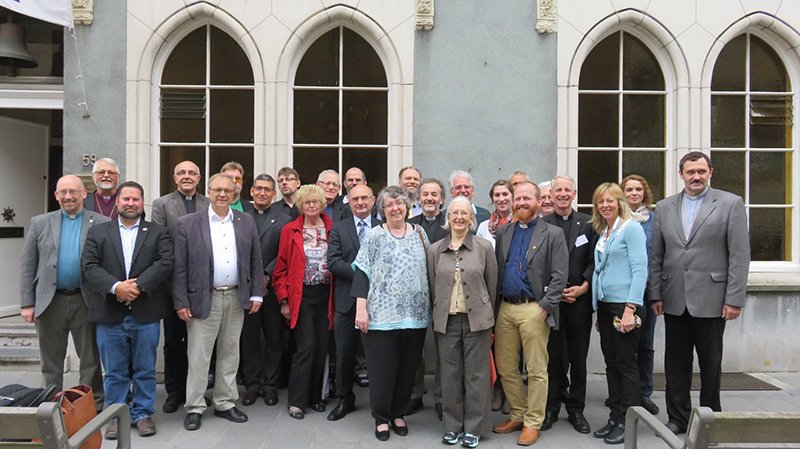
BELGIUM – From June 1-5, 2016 Lutherans from several European Lutheran churches assembled in Antwerp, Belgium, for the 24th European Lutheran Conference (ELC), under the theme ‘Reformation then … and now.’
The conference was attended by ELC member churches representatives from Belgium, Denmark, England, France, and Germany, as well as by guests from the Czech Republic, Finland, Norway, Russia, Sweden, Switzerland, and the United States of America.
A keynote address on the conference’s theme was delivered by Dr. Werner Klän of Germany. An opening service, morning devotions with Bible studies, and evening prayers shaped the spiritual frame of the conference. Several of the guest churches in attendance have expressed their intention to apply for membership in the coming years.
A special focus of this year’s conference was the commemoration of the 450th anniversary of the establishment of the first Lutheran congregation in Antwerp, which was founded in 1566. From June 2-3, the Evangelical Lutheran Church in Belgium (ELKB) hosted an international conference highlighting this event, organized by ELKB President Gijsbertus van Hattem in cooperation with the University of Antwerp, and held at the Rubenianum.
The conference was opened with two keynote lectures: “The International Dimensions of the Wittenberg Reformation” by Dr. Robert Kolb (Concordia Seminary, St. Louis, Missouri), and “Reformation Movements and the Wonderyear: the Antwerp Context” by Dr. Guido Marnef (University of Antwerp). The second day of the conference featured six additional lectures: “The Role of Antwerp’s Reformed Augustinians in the Early Reformation” by Dr. Robert Christman (Luther College, Decorah, Iowa); “Humanists on the Move: The Transfer of Ideas Between Wittenberg and Antwerp” by Dr. Victoria Christman (Luther College, Decorah, Iowa); “The First Lutheran Congregation 1566–1585 and Beyond” by Rev. Gijsbertus van Hattem (Lutheran Church of Antwerp, Belgium); “Polemics, Church Order and Confession: Matthias Flacius Illyricus in Antwerp during the ‘Wonderjaar’ 1566/67” by Dr. Luka Ilic (Leibniz Institute, Mainz, Germany); “Christopher Plantin, Printing for the Reformation” by Dirk Imhof (Plantin-Moretus Museum, Antwerp, Belgium); and “The Image Debates in the Low Countries: an Art Historical Review” by Dr. Koenraad Jonckheere (Ghent University, Belgium). The conference concluded with a walking tour through 16th Century Antwerp, ending with a reception at the Town Hall, where Antwerp’s mayor Bart De Wever welcomed the participants.
The European Lutheran Conference concluded with Divine Service on June 5. ELKB President and local pastor Gijsbertus van Hattem led the liturgy, while President Leif Jensen of the Evangelical Lutheran Free Church in Denmark preached.
The next conference of the European Lutheran Conference will be held in England in 2018.
All of the member churches of the ELC are also member churches of the International Lutheran Council, a global association of confessional Lutheran churches.
